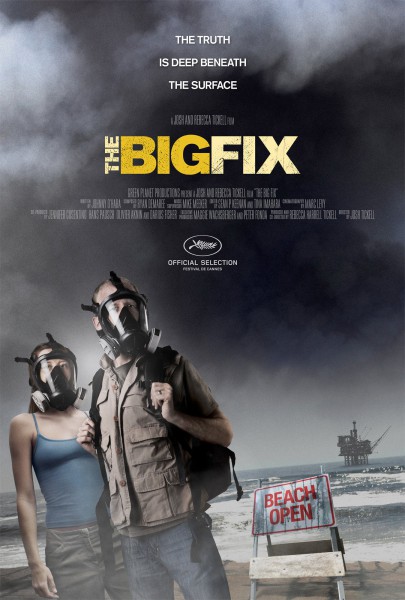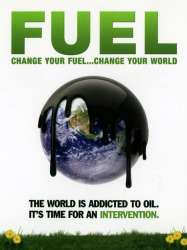The Big Fix is a american film of genre Documentary directed by Rebecca Harrell Tickell with Josh Tickell
The Big Fix (2011)

If you like this film, let us know!
Length 1h30
OriginUSA
Genres Documentary
Themes Environmental films, Documentary films about environmental issues, Documentary films about technology
Rating76%










The Big Fix is a 2012 documentary film about two filmmakers, Josh and Rebecca Tickell, as they travel along the coast of the Gulf of Mexico meeting the residents whose lives were changed by the 2010 BP Oil Spill. The film argues that BP has utilized the oil dispersant Corexit in the Gulf to create the illusion that the Louisiana beaches are safe and the water (and seafood) uncontaminated.
Actors
Comments
Leave comment :
Suggestions of similar film to The Big Fix
There are 93 films with the same actors, 2 films with the same director, 8961 with the same cinematographic genres, 1027 films with the same themes (including 136 films with the same 3 themes than The Big Fix), to have finally 70 suggestions of similar films.If you liked The Big Fix, you will probably like those similar films :

Fuel (2008)
, 1h52Directed by Josh Tickell
Origin USA
Genres Drama, Documentary
Themes Environmental films, Documentary films about environmental issues, Documentary films about technology
Actors Josh Tickell, Larry Hagman, Sheryl Crow, Woody Harrelson, Neil Young, Larry David
Rating72%






Pump (2014)
, 1h28Directed by Rebecca Harrell Tickell, Josh Tickell
Origin USA
Genres Documentary
Themes Environmental films, Documentary films about environmental issues, Documentary films about technology
Actors Jason Bateman
Rating75%






Waterwalker (1984)
, 1h27Directed by Bill Mason
Origin Canada
Genres Documentary
Themes Environmental films, Seafaring films, Sports films, Transport films, Documentary films about sports, Documentary films about environmental issues, Documentary films about technology
Actors Bill Mason
Rating80%






Gasland (2010)
, 1h44Directed by Josh Fox
Origin USA
Genres Documentary
Themes Environmental films, Documentary films about environmental issues, Documentary films about technology
Actors Josh Fox
Rating75%





Fox narrates his reception of a letter in May, 2008, from a natural gas company offering to lease his family's land in Milanville, Pennsylvania for $100,000 to drill for gas. Fox then set out to see how communities are being affected in the west where a natural gas drilling boom has been underway for the last decade. He spent time with citizens in their homes and on their land as they relayed their stories of natural gas drilling in Colorado, Wyoming, Utah, and Texas, among others. He spoke with residents who have experienced a variety of chronic health problems directly traceable to contamination of their air, of their water wells or of surface water. In some instances, the residents are reporting that they obtained a court injunction or settlement money from gas companies to replace the affected water supplies with potable water or water purification kits.

The Power Makers (1957)
, 10minutesDirected by Lee Robinson
Genres Documentary
Themes Environmental films, Documentary films about environmental issues, Documentary films about technology
Actors James Condon

No More Hiroshima (1984)
Genres Documentary
Themes Environmental films, Seafaring films, Transport films, Aviation films, Documentary films about environmental issues, Documentary films about war, Documentary films about historical events, Documentary films about nuclear technology, Documentary films about technology, Political films, Documentary films about World War II

Voices of Transition (2012)
, 1h5Origin France
Genres Documentary
Themes Environmental films, La mondialisation, Films about the labor movement, Documentary films about business, Documentary films about environmental issues, Documentary films about technology, Documentaire sur le monde du travail, Disaster films
Rating75%





Using interviews and overlays of graphics and text, the film presents the current problems facing industrial agriculture. It explores why in the interviewees' view the current industrial model is not up to the task of feeding the world's people. According to the film every calorie of energy contained in a food source currently takes between 10 and 20 calories of crude oil in the production of fertilizers and transportation to produce, leading to a strong dependence of the cost of food on oil prices. As a result of peak oil and increasing oil prices this dependence will lead to ever increasing food prices. According to the film, this dependence already represents a significant weak-spot in the global food supply chain. Additionally, agriculture is already responsible for 40% of greenhouse gas emissions, contributing to climate change. Furthermore, the film argues that the overuse of inorganic fertilizers has been responsible for the loss of soil fertility and threatens the complete loss of usable soil within the next decades through soil erosion and sinking crop yields. These effects, according to the film, can only be partly mitigated by the increased use of those same fertilizers. The loss of workplaces, the concentration of land in the hands of a few (allegedly a farm closes every 23 minutes in France) as well as the dependence on large corporations are enumerated as side effects of the industrialisation of agriculture since the 1920s. Companies, such as Monsanto and Bayer, control everything from seed stock to fertilizers and the necessary chemical mixes for hybrid plants, thereby controlling the entire supply chain. The film argues that this development was supported through subsidies from the World Bank. Interviews with Vandana Shiva, the founder of the Transition Towns movement Rob Hopkins and various agricultural experts serve to argue this viewpoint. The dependence on crude oil is illustrated through the example of the wholesale food market in Rungis.

Kahl (1961)
, 12minutesGenres Documentary
Themes Environmental films, Documentary films about environmental issues, Documentary films about nuclear technology, Documentary films about technology
Rating61%






Pandora's Promise (2013)
, 1h27Origin USA
Genres Documentary
Themes Environmental films, Documentary films about environmental issues, Documentary films about nuclear technology, Documentary films about technology
Rating72%





 , 1h35
, 1h35Genres Documentary
Themes Environmental films, Documentary films about environmental issues, Documentary films about technology, Documentary films about cities
Rating65%





 Connection
Connection



